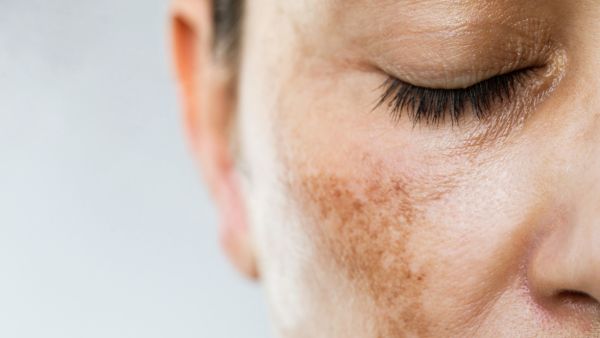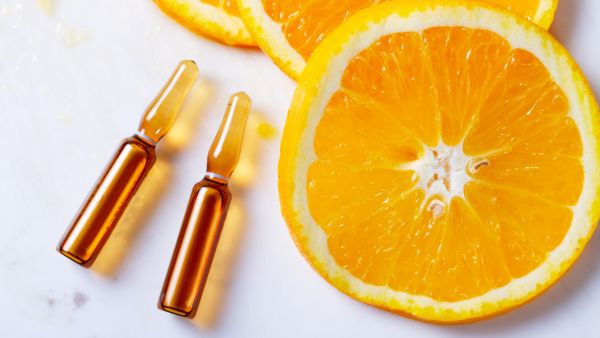Hyperpigmentation: Disappear Dark Spots & Reclaim Your Natural Radiance
If you're over the age of 40 you've probably noticed some discoloration starting on your cheeks and forehead. Those pesky splotches have seemingly appeared overnight.
But the truth is that as we age, our skin undergoes significant changes. One of the most frustrating changes can be the appearance of dark spots, uneven skin tone and hyperpigmentation.
These stubborn discolorations are no fun and can cause us to feel self-conscious about our skin, spending money on countless products, concealers, as well as other more invasive interventions like laser treatments.
The root causes of hyperpigmentation in women 40+ come down to hormonal changes, sun damage, genetics and inflammation from underlying skin conditions like eczema or menopausal acne. These factors leads to an increase in melanin production causing darker patches of skin that most commonly appear on cheeks, forehead, and around the mouth.
The conventional skincare dilemma
Hyperpigmentation can be an elusive skin concern to correct, and many women turn to a variety of traditional treatments to find a solution. While these options have shown some effectiveness, they can also come with real drawbacks.
Below is a list of several of the most common ingredients used to address skin discoloration and thei rpotential side effects.
Hydroquinone: For decades, this skin lightening agent has been a go-to ingredient for depigmentation, due to its ability to inhibit melanin production. But hydroquinone can be extremely irritating to skin, causing uncomfortable rashes. Its safety has also been questioned, leading to restrictions in some countries. What’s more, the FDA has received reports of serious side effects from the use of hydroquinone, such as facial swelling and in rare cases, permanent skin discoloration (ochronosis)!
Retinoids: Derived from vitamin A, retinoids like Tretinoin are considered by some to be the gold standard for treating hyperpigmentation. While effective for stimulating cell turnover and improving skin texture, they can cause severe dryness, peeling, redness, and photosensitivity. They are generally not recommended for sensitive skin and contraindicated during pregnancy due to the risk for potential birth defects. Yikes!
Azelaic acid: Although this gentle acid has anti-inflammatory and exfoliating properties that can help with hyperpigmentation, it is better suited for addressing acne and rosacea. Generally well-tolerated, it can still cause dryness, itching, and redness in some individuals.
Alpha-arbutin: Geared toward hyperpigmentation, dark spots, and discoloration, alpha-arbutin may, in rare cases, cause redness in sensitive skin.
While these ingredients do offer skin brightening benefits, their potential side effects can make them unsuitable for some women, especially those who are pregnant, nursing, or have a history of sensitive, reactive skin.
A gentler alternative, introducing Aspen Dew
For those seeking a more holistic approach to hyperpigmentation, Aspen Dew Illuminating Essence is a gentle yet effective alternative to harsh hyperpigmentation solutions.
Our formula is carefully crafted with naturally-derived alpine actives that work synergistically to address sun spots without compromising skin health. Unlike topical retinoids, Aspen Dew delivers visibly brighter, smoother skin without irritation, dryness, peeling or increased photo-sensitivity.

How Aspen Dew works to combat hyperpigmentation
When it comes to hyperpigmentation, the solution is never a single ingredient product. By combining potent whole plant ingredients into one formula, Aspen Dew provides a comprehensive solution for hyperpigmentation, gently addressing discoloration from multiple biological pathways.
Dew bean: A natural retinol alternative, dew bean gently exfoliates the skin, promoting skin renewal and helping to support cellular turnover. Unlike traditional retinoids, dew bean delivers smoother, brighter, polished skin without risk of reactions.
Aspen bark: Known for calming angry skin, aspen bark extract helps combat inflammation, a common contributor to hyperpigmentation. Aspen bark extract contains a blend of polyphenols and salicin, a precursor to salicylic acid. Salicin acts as a gentle exfoliator to help shed dead skin cells, enhancing texture, diminishing the appearcence of pores, and revitalizing skin.
Bearberry: Containing beta-arbutin, a gentler botanically derived cousin of alpha-arbutin, beta-arbutin helps to curb tyrosinase activity, the skin enzyme responsible for melanin production.
Edelweiss: This resilient alpine wildflower is known to help reduce the appearance of fine lines & wrinkles. With twice the free radical scavenging power of Vitamin C, edelweiss helps fortify skin against environmental stressors that contribute to hyperpigmentation. Antioxidants leontopodic acid and isochlorogenic acid work overtime to smooth and firm skin.
Niacinamide: A vitamin B3 derivative, niacinamide helps fight dark spots in three distinct ways; by helping to reduce inflammation, through its action on melanin synthesis to inhibit pigment transfer, and by supporting skin barrier health.
Micro-molecular hyaluronic acid: Using the smallest molecular variation of hyaluronic acid available for deeper skin absorption, this hydrating powerhouse attracts and retains moisture, plumping the skin and creating a smooth, dewy canvas. Hydrated skin is better equipped to defend against environmental damage and maintain a healthy glow.
Sun Protection
Consistent sun protection (SPF and protective clothing) is essential to preventing new sun spots and protecting existing ones from darkening.
Look for sunblocks without toxic chemicals such as Oxybenzone. For more on choosing a non-toxic sunscreen read “Safe Alternatives to Chemical Sunscreen Ingredients.”
Professional treatments for hyperpigmentation
Though treatments like IPL and chemical peels may help address stubborn hyperpigmentation, always consult a dermatologist before beginning any skin care intervention.
Hyperpigmentation takeaways
Hyperpigmentation is a common skin concern among women over 40, caused by factors such as hormonal changes, sun damage, genetics, and inflammation. It can lead to uneven skin tone and be a blow to our self confidence.
Traditional treatments like hydroquinone, retinoids, and azelaic acid can be effective but often cause side effects such as peeling, irritation, dryness, and increased sun sensitivity.
Aspen Dew is a holistic alternative that addresses hyperpigmentation without these drawbacks. Its unique blend of active ingredients, including edelweiss, dew bean, aspen bark, niacinamide, and hyaluronic acid, works to brighten skin, reduce inflammation, and promote cell turnover.
Key benefits of Aspen Dew:
- Gentle and effective
- Addresses hyperpigmentation from multiple angles
- Improves skin texture and hydration
- No irritation, dryness, or increased sun sensitivity
Aspen Dew offers a promising solution for women seeking to improve their skin tone and radiance without harsh chemicals or irritating treatments.
Learn more about Aspen Dew Illuminating Essence.
Continue reading



